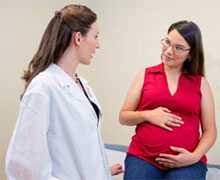Answering Patient Questions


Get Free Materials for Your Patients
CDC has posters, fact sheets, and other resources to help explain the importance and health benefits of the Tdap recommendation. They are free to download and ready for color or black and white printing and reproduction. English and Spanish language versions are available.
Your patients may have questions about receiving the tetanus toxoid, reduced diphtheria toxoid, and acellular pertussis (Tdap) vaccine during pregnancy, even if they are planning to get it. Below, CDC provides some examples of straightforward messages that resonate well with pregnant women to make it easier for you and your staff to make a strong, effective recommendation.
Q: Do you think your patients should get this vaccine while pregnant?
A: I strongly believe in the importance and benefits of the whooping cough vaccine, which is why I recommend it to all my patients early in the third trimester. It’s the most important thing we can do to help protect your newborn from this deadly disease.
Q: Why is this vaccine recommended during pregnancy?
A: The whooping cough vaccine is recommended early in your third trimester so that your body can create antibodies and have time to pass them to your baby before birth. These antibodies will help protect your baby when he is most vulnerable to serious complications from this disease. The vaccine you get will help protect your baby as soon as he is born and until he is able to start getting his own whooping cough vaccines at 2 months of age.
Q: Who supports this recommendation?
A: CDC, other doctors and midwives like me who specialize in caring for pregnant women, and pediatricians agree that the whooping cough vaccine is safe and important to get during pregnancy.
Q: Is the vaccine safe?
A: The whooping cough vaccine is very safe, and I do not have any concerns for you or your baby. The most common side effects in my experience are mild, like redness, swelling, or pain in your arm where you get the shot. This should go away within a few days. Medical and scientific experts have carefully studied this vaccine. Getting the whooping cough vaccine during pregnancy does not put you at increased risk for pregnancy complications like low birth weight or preterm delivery.
Q: Is whooping cough an issue anymore?
A: We used to think of whooping cough as a disease of the past, but it’s making a comeback. In recent years, we’ve had between 10,000 and 50,000 reported cases of whooping cough each year in the United States. In fact, there are cases reported in every state. Whooping cough is on the rise in the United States. Recently, we saw the most cases we had seen in 60 years.
Q: Why is whooping cough a concern for my baby?
A: Whooping cough is more serious for babies than other common coughing illnesses like croup. In fact, many babies with whooping cough don’t cough at all, which can make it hard for you to even tell if your baby has whooping cough. Instead, it can cause them to stop breathing. About half of babies younger than 1 year old who get whooping cough need treatment in a hospital. Since 2010, up to 20 babies have died each year in the United States. Most whooping cough deaths are among babies who are too young to be protected by their own vaccination, which begins at 2 months of age.
Q: Wouldn’t I know if someone around my baby has whooping cough?
A: Some people with whooping cough may just have a mild cough or what seems like a common cold, especially if they have been previously vaccinated. Since symptoms can vary, children and adults may not know they have whooping cough and can end up spreading it to babies that they are in close contact with.
Q: I got the vaccine with my last pregnancy. Why do I need it again?
A: The amount of whooping cough antibodies in your body is greatest about 2 weeks after getting the vaccine. However, those antibody levels decrease over time. It is important for you to get a whooping cough vaccine during each pregnancy so that each of your babies get the greatest number of protective antibodies from you and the best protection possible against this disease.
Q: Why shouldn’t I get it in the hospital after giving birth?
A: When you get the whooping cough vaccine during pregnancy, you will pass protective antibodies to your baby before birth, so both you and your baby have protection.
CDC used to recommend that women get the whooping cough vaccine in the hospital after giving birth. This helped prevent moms from getting whooping cough and passing it on to their babies. Unfortunately, the babies did not benefit from protective antibodies and could still get whooping cough from others.
Q: Is it safe to breastfeed after getting the whooping cough vaccine?
A: Yes, in fact you can pass some whooping cough protection to your baby by breastfeeding. When you get a whooping cough vaccine during your pregnancy, you will have protective antibodies in your breast milk that you can share with your baby as soon as your milk comes in. However, your baby will not get immediate or the greatest number of protective antibodies if you wait to get a whooping cough vaccine until after delivering your baby. This is because it takes about 2 weeks after you get the vaccine before your body develops high levels of antibodies.
- Page last reviewed: June 29, 2017
- Page last updated: June 29, 2017
- Content source:



 ShareCompartir
ShareCompartir